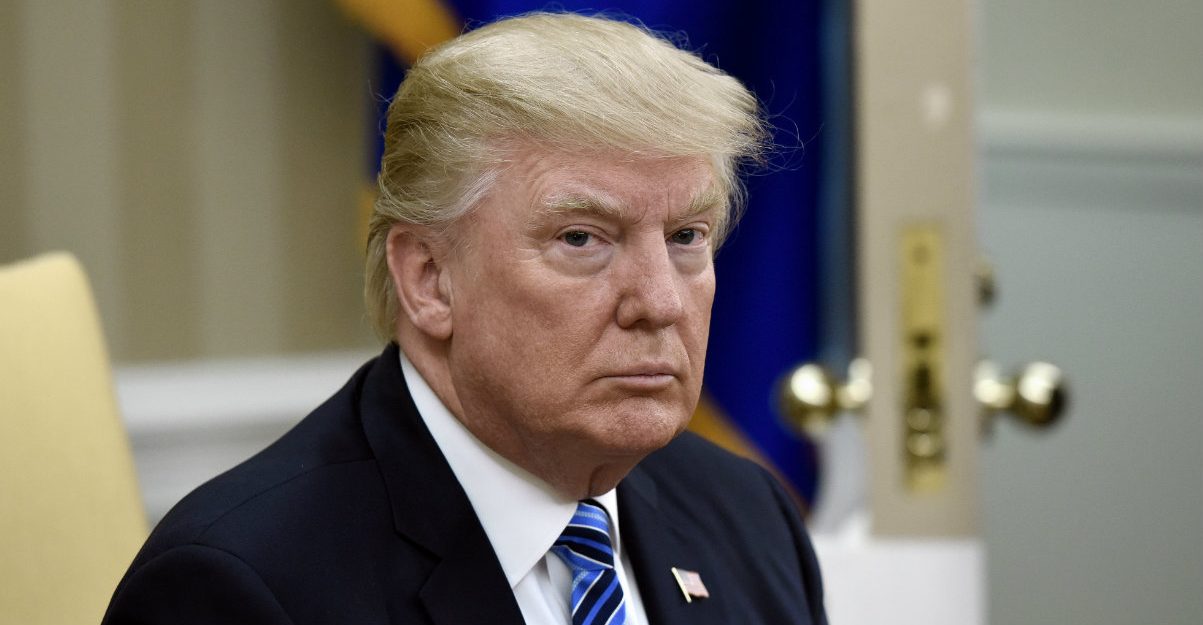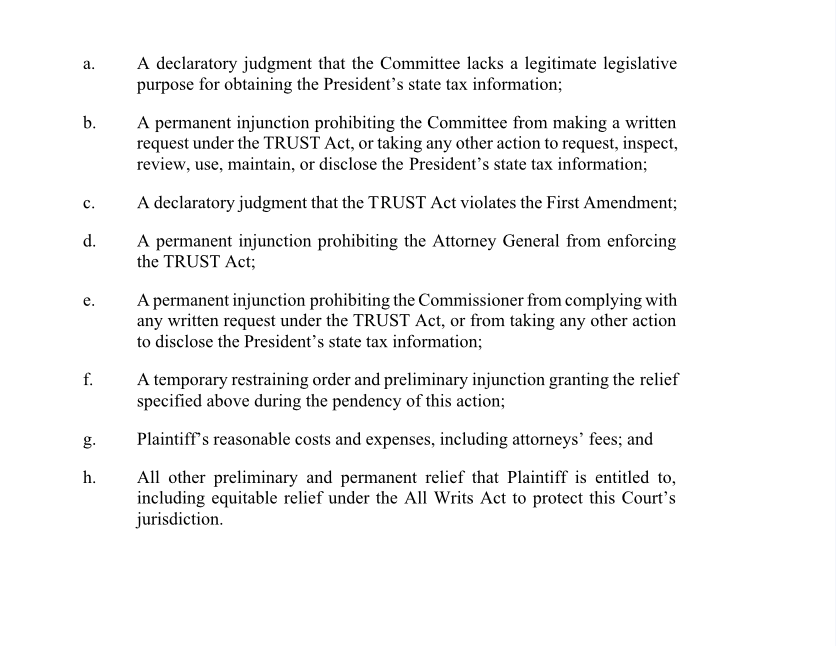
President Donald Trump‘s Consovoy McCarthy PLLC attorneys filed yet another lawsuit on Tuesday, this one in the U.S. District Court for the District of Columbia on behalf of Trump the private citizen. It was a response to New York state’s recent legislative maneuverings aimed at giving Congress access to Trump’s state tax returns.
The defendants are named as the House Ways and Means Committee, New York Attorney General Letitia James and Commissioner of the New York State Department of Taxation and Finance Michael Schmidt.
Trump, who has long resisted releasing his tax returns (saying that they were under audit, as if this was an impediment to releasing the information), sued to block the congressional subpoena from the House Ways and Means Committee and its Chairman Rep. Richard Neal (D-Mass.). Neal sought to obtain Trump’s federal tax returns from the Treasury Department.
The Department of Justice’s (DOJ) Office of Legal Counsel (OLC) eventually published an opinion in response, supporting Treasury Secretary Steven Mnuchin‘s refusal to hand over the tax returns. The opinion, penned by OLC’s Assistant Attorney General Steven Engel, said that House Democrats were using 26 U.S. Code § 6103(f) merely as a pretext to obtain Trump’s tax returns. Engel said that Mnuchin was right to say this was not a legitimate legislative purpose.
“While the Executive Branch should accord due deference and respect to congressional requests, Treasury was not obliged to accept the Committee’s stated purpose without question, and based on all the facts and circumstances, we agreed that the Committee lacked a legitimate legislative purpose for its request,” Engel said.
As all of this was happening, New York state lawmakers were developing a backup plan that Neal was somewhat wary of. Earlier in July, New York Gov. Andrew Cuomo (D) signed the TRUST Act into law, which he said would give Congress the “ability to fulfill its Constitutional responsibilities to strengthen our democratic system and ensure that no one is above the law. Tax secrecy is paramount — the exception being for bona fide investigative and law enforcement purposes.” New York state Sen. Brad Hoylman‘s (D) even called the TRUST Act “a constitutional escape hatch should they not want to wait for the federal court case and its appeals process to be finalized.”
All of this is relevant because most of the same arguments and same comments from prominent Democrats made appearances in Trump’s latest lawsuit. The most familiar among these? “No legitimate legislative purpose exists to request the President’s state tax returns. Congress has no authority to regulate New York income taxes. And state tax returns would not give Congress pertinent information about federal taxes, since the TRUST Act requires that any federal information be redacted. The primary purpose of any request under the TRUST Act would be exposure for the sake of exposure, law enforcement, or some other wholly impermissible goal— not pursuing valid federal legislation.”
Trump lawyers began the lawsuit with a nod to the following Secretary Mnuchin quote: “The public record demonstrates that the animating purpose of [the Committee’s request] was and remains exposure of a political opponent’s private tax information.” Trump lawyers said that the state of New York shared the very same “animating purpose” and is “eager to help the Committee expose the President’s private tax information. ”
The plaintiff claimed that the TRUST Act is plainly a political attack on Trump in violation of his First Amendment right not to be tormented by “laws enacted for the purpose of discriminating or retaliating against an individual for his politics or speech.” The lawsuit also claimed that defendants violated “Article I of the Constitution and the House Rules.”
Trump lawyers pointed to the statements of New York legislators to show that the TRUST Act is a politically-motivated piece of legislation:
New York legislators admitted that the TRUST Act’s purpose was to help the Committee expose the President’s private tax information for political gain; its purpose was their purpose. And New York Democrats designed the TRUST Act to be a complement to the Committee’s litigation over the President’s federal tax returns—a “workaround,” an “‘in case of emergency break glass’” option, a “constitutional escape hatch should [the Committee] not want to wait for the federal court case and its appeals process to be finalized.” The TRUST Act also grew out of a larger campaign in New York to uncover and expose the President’s private financial information in the hopes of damaging him politically.
Notice that state Sen. Hoylman’s “constitutional escape hatch” remark was referenced in the paragraph above.
The next argument? Even Chairman Neal thought using the TRUST Act was a bad idea:
Committee Chairman Richard Neal was initially reluctant to use the TRUST Act. The New York returns have nothing to do with the reason he gave for requesting the President’s federal returns: “investigating the mandatory presidential audit program at the IRS to determine whether or not the program needs to be codified into federal law.” In fact, if Chairman Neal requested the New York returns, it would prove one of the defendants’ key arguments in the litigation over the federal returns—that the Chairman is trying to expose the President’s financial information for political gain, not to study the IRS’s audit procedures.
Despite his initial reluctance, Chairman Neal has recently changed his tune on the TRUST Act. According to a news report published yesterday, Chairman Neal is facing intense pressure from his fellow Democrats to invoke the TRUST Act and obtain the President’s state tax returns. Succumbing to this pressure, the Chairman recently announced that he does not oppose using the TRUST Act and that House counsel was “reviewing” it now.
Trump lawyers said that the president had no choice but to sue and “safeguard his legal rights” because the House counsel’s “review could end—and Chairman Neal could decide to request the President’s state returns—at any time, with no notice to the President. And New York could respond to the request nearly instantaneously, mooting the President’s ability to object before his tax records are disclosed.”
Trump attorneys then said House Ways and Means Committee’s jurisdiction is “limited to federal taxes” and that “no legislation could possibly result from a request for the President’s state tax returns.” Chairman Neal has said the following words out loud in the past: “We don’t have jurisdiction over New York taxes.”
As a result of all of the above, Trump attorneys once again asserted that the House Ways and Means Committee “lacks a legitimate legislative purpose for using the TRUST Act.” They went on take aim at various Democratic officials in New York.
“Like House Democrats, Democratic officials in New York have used every tool at their disposal to expose the President’s private financial information,” the filing said. “And like House Democrats, their goal is to retaliate against President Trump and damage him politically.”
Trump attorneys were not shy about providing examples of public statements made by Democratic officials, in an effort to show the true motivation behind the legislative efforts:
The Attorney General of New York State, for example, took office following a campaign where she promised to “begin … an investigation into the Trump Administration with respect to his finances in the State of New York” and bring “the days of Donald Trump … to an end.” On several occasions she stated, “The president of the United States has to worry about three things: 1. Mueller 2. Cohen, and 3. Tish James. We’re all closing in on him.” She represented that, if elected, “we will join with law enforcement and other attorneys general across this nation in removing this president from office.” “I will be shining a bright light into every dark corner of his real estate dealings.” “[W]e’re going to definitely sue him. We’re going to be a real pain in the ass. He’s going to know my name personally.” The Attorney General also tweeted to Democrats in Congress, promising “to help Democrats take on Donald Trump” and “investigate” him.
“President Trump had no choice but to file this lawsuit to protect his constitutional rights,” the suit continued. “The Committee cannot invoke the TRUST Act and request the President’s state tax returns without a legitimate legislative purpose,” Trump attorneys asserted.
Claiming violations of Trump’s First Amendment rights and violations of House Rules (“The Committee also lacks statutory jurisdiction to request the President’s state tax returns. The House Rules authorize the Committee to oversee ‘Federal laws,’ not state tax laws”), Trump lawyers asked the court to strike down the Trust Act as unconstitutional.
“As revealed by its text, history, effect, and stated purposes, the New York Legislature enacted it to discriminate and retaliate against President Trump for his speech and politics. This Court should declare it unconstitutional and enjoin its operation,” Trump lawyers argued.
Here’s a snapshot of everything being sought through this lawsuit:

You can read the lawsuit in full below.
Trump Sues to Block Release of Tax Returns by Law&Crime on Scribd
[Image via Olivier Douliery/ Pool and Getty Images]
Have a tip we should know? [email protected]